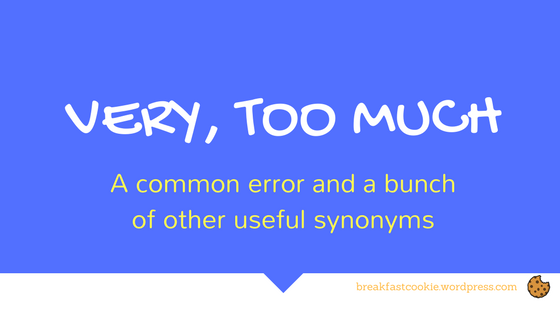‘Very’ vs ‘Too’ and a Bunch of Other Useful Synonyms

Very vs. Too
I often see this common error in people from all native lanaguges.
“I went to the movies on the weekend and it was too much fun.”
I always think to myself, “Why is that a bad thing?” This is because ‘too much’ in English has a negative connotation.
Please note that these two pieces of vocabulary have a distinct difference to each other.
Very = a lot, more than usual.
E.g. “We can’t get a booking at the restaurant until 9pm because it is very busy tonight.”
E.g. “Be careful when you touch the plate, it is very hot.”
E.g. “She has a lot of pairs of shoes.”
Too = exceeding what is acceptable. It may prevent something from happening and is more based on opinion.
E.g. “I don’t like this restaurant because it’s too crowded.”
E.g. “I can’t touch the plate yet because it is too hot.”
E.g. “She has too many pairs of shoes.”
Alternatives for ‘Very good’
Have you ever been at the front counter at a supermarket and listened to the attendant ask everyone, “Hi, how are you?”
What is usually the customer’s answer? Pretty good, very good, very well…
For me, I’ve always found this answer a little boring. I used to work as a supermarket attendant and I loved to meet the different personalities at the counter each day. Now, I always take joy in starting up interesting conversations by answering with a more dynamic synonym, such as “I’m stupendous, thank you!”
So next time you are trying to describe someone’s personality or mood, instead of saying, ‘Very good’, ‘Very bad’ or ‘very nice’, try mixing it up with these synonyms.

The Cookie Chef
